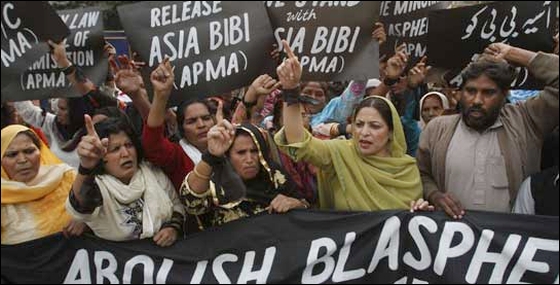Pakistan |
Pakistan will not repeal blasphemy law: minister
Reuters
November 23, 2010
November 23, 2010

Protesters hold up placards while demanding the release of Asia Bibi, a Pakistani Christian woman who has been sentenced to death for blasphemy, at a rally in Lahore November 21, 2010. — Reuters
ISLAMABAD: Pakistan will not repeal its controversial blasphemy law but may amend it to prevent abuse because scrapping the legislation could fuel militancy, a government minister said on Tuesday.
The law, which carries the death penalty for insulting Islam or its Prophet Mohammad, has come under the spotlight this month after a court sentenced a Christian mother of four, Asia Bibi, to death in a case stemming from a village dispute.
Widespread media attention on the case has led to renewed appeals by human rights groups for the repeal of the law but Minister for Minorities Shahbaz Bhatti said that would not happen.
“(Repeal) is not being considered though we are considering changing it so that misuse of the law should be stopped,” Bhatti told Reuters.
The law enjoys widespread support in Pakistan, which is more than 95 per cent Muslim, and politicians are loathe to be seen as soft on the defense of the religion.
Blasphemy convictions are common although the death sentence has never been carried out. Most convictions are thrown out on appeal, but angry mobs have killed many people accused of blasphemy.
Bhatti said consultations with Islamic clerics and representatives of religious minorities on amending the law would soon be held.
He said repealing it was not being considered because that could provoke religious parties and militants who want to topple the pro-US civilian government.
“We have to analyse what the reaction of those having intolerant attitudes will be,” Bibi [Bhatti] said. “At this point our aim is to stop its misuse.”
Critics say the law can be misused by people making false accusations against rivals.
Liberal and secular groups say the law discriminates against religious minorities who make up roughly 4 per cent of Pakistan’s 170 million population. Most members of minorities are Christian.
Bhatti said an initial inquiry into the case of the Christian mother suggested she had not committed blasphemy but was falsely accused after a quarrel.
Bibi, the first woman sentenced to death for blasphemy, has appealed to President Asif Ali Zardari to pardon her.
“It will take few more days. We are looking into different things, not just pardon. She could get relief from the courts,” Bhatti said.
Authorities were providing Bibi with security in jail and her family had also moved for safety reasons, he said.
New York-based Human Right Watch has said the blasphemy law and government’s failure to address religious persecution by extremist groups effectively enable atrocities against minorities. – Reuters
The law, which carries the death penalty for insulting Islam or its Prophet Mohammad, has come under the spotlight this month after a court sentenced a Christian mother of four, Asia Bibi, to death in a case stemming from a village dispute.
Widespread media attention on the case has led to renewed appeals by human rights groups for the repeal of the law but Minister for Minorities Shahbaz Bhatti said that would not happen.
“(Repeal) is not being considered though we are considering changing it so that misuse of the law should be stopped,” Bhatti told Reuters.
The law enjoys widespread support in Pakistan, which is more than 95 per cent Muslim, and politicians are loathe to be seen as soft on the defense of the religion.
Blasphemy convictions are common although the death sentence has never been carried out. Most convictions are thrown out on appeal, but angry mobs have killed many people accused of blasphemy.
Bhatti said consultations with Islamic clerics and representatives of religious minorities on amending the law would soon be held.
He said repealing it was not being considered because that could provoke religious parties and militants who want to topple the pro-US civilian government.
“We have to analyse what the reaction of those having intolerant attitudes will be,” Bibi [Bhatti] said. “At this point our aim is to stop its misuse.”
Critics say the law can be misused by people making false accusations against rivals.
Liberal and secular groups say the law discriminates against religious minorities who make up roughly 4 per cent of Pakistan’s 170 million population. Most members of minorities are Christian.
Bhatti said an initial inquiry into the case of the Christian mother suggested she had not committed blasphemy but was falsely accused after a quarrel.
Bibi, the first woman sentenced to death for blasphemy, has appealed to President Asif Ali Zardari to pardon her.
“It will take few more days. We are looking into different things, not just pardon. She could get relief from the courts,” Bhatti said.
Authorities were providing Bibi with security in jail and her family had also moved for safety reasons, he said.
New York-based Human Right Watch has said the blasphemy law and government’s failure to address religious persecution by extremist groups effectively enable atrocities against minorities. – Reuters
©2010 DAWN Media Group. All rights reserved




